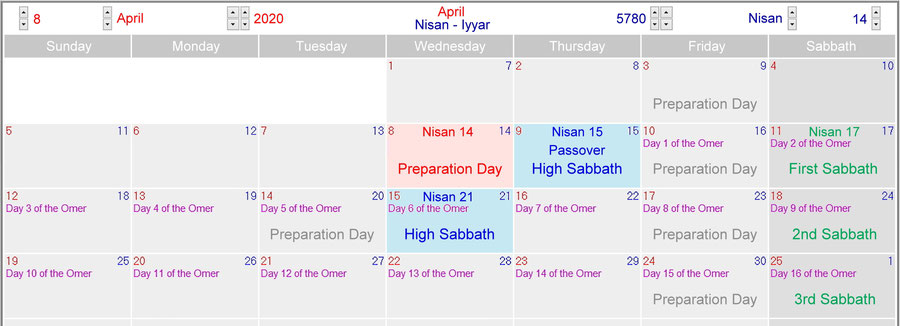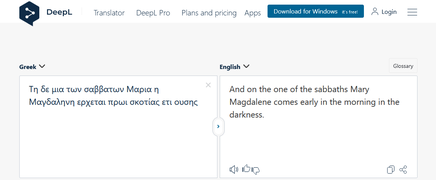- Home
- English
- Structure of the Bible
- Structure of the Menorah
- Ancient Menorahs
- Calendar and Feasts
- Resurrection on Sabbath
- Introduction
- Day
- Sabbath
- High Sabbath
- Pre-Sabbath
- Week
- Interlinear Bible
- Church Opinions
- 1. No Sunday
- 2. A Sabbath
- 3. No Friday
- 4. Intermediate Day
- 5. Three Days and Three Nights
- 6. Manipulations
- 6.1 Sabbath not Sunday
- 6.2 Plural σαββατων not week
- 6.3 one not first
- 6.5 Day of the Sabbaths
- 6.7 Lords Day
- 7. Old Bibles
- Greek Bibles
- Latin Bibles
- Gothic Bible
- English Manuscripts
- English Bible Prints 1
- English Bible Prints 2
- English Bible Prints 3
- English Bible Prints 4
- German Manuscripts
- German Bible Prints 1
- German Bible Prints 2
- Spanish Bibles
- Italian Bibles
- Swedish Bibles
- μια των σαββατων
- Mt 28-1
- Mk 16-2
- Mk 16-9
- Lk 24-1
- John 20-1
- John 20-19
- Acts 20-7
- 1Cor 16-2
- Lk 18-12
- 7 Languages
- Palm Sabbath
- Omer
- Summary
- The Rapture
- Rabbi Kaduri Note
- 666
- 888
- Video
- Info
- Francais
- Deutsch
- Espanol
- Dutch
- Ελληνική
- Pусский
- Introduction
- Day
- Sabbath
- High Sabbath
- Pre-Sabbath
- Week
- Interlinear Bible
- Church Opinions
- 1. No Sunday
- 2. A Sabbath
- 3. No Friday
- 4. Intermediate Day
- 5. Three Days and Three Nights
- 6. Manipulations
- 6.1 Sabbath not Sunday
- 6.2 Plural σαββατων not week
- 6.3 one not first
- 6.5 Day of the Sabbaths
- 6.7 Lords Day
- 7. Old Bibles
- Greek Bibles
- Latin Bibles
- Gothic Bible
- English Manuscripts
- English Bible Prints 1
- English Bible Prints 2
- English Bible Prints 3
- English Bible Prints 4
- German Manuscripts
- German Bible Prints 1
- German Bible Prints 2
- Spanish Bibles
- Italian Bibles
- Swedish Bibles
- μια των σαββατων
- Mt 28-1
- Mk 16-2
- Mk 16-9
- Lk 24-1
- John 20-1
- John 20-19
- Acts 20-7
- 1Cor 16-2
- Lk 18-12
- 7 Languages
- Palm Sabbath
- Omer
- Summary
John 20:1 - The women came to the tomb on a Sabbath
John 20:1: "The first day of the week cometh Mary Magdalene early, when it was yet dark, unto the sepulchre..." - This is the text of the King James Bible (KJV), but the basic Greek text speaks of a completely different day, namely of a Sabbath. Below are the Greek words with pronunciation (transcription) and literal translation:
"τη (te; on the) δε (de; but, now) μια (mia; one) των (ton; of the) σαββατων (sabbaton; Sabbath/s) μαρια (maria; Mary) η μαγδαληνη (he magdalene; the Magdalene) ερχεται (erchetai; comes) πρωι (proi; early) σκοτιας (skotias; dark) ετι (eti; still) ουσης (ouses; is being)...
The translation into English is very simple: "But on one of the Sabbaths (or Sabbath days or on a Sabbath) Mary the Magdalene comes in the morning when it was still dark..."
Six translation errors in one sentence
The comparison of the basic Greek text with the King James Bible (KJV) shows that in support of the alleged Sunday resurrection of Jesus six translation errors were made in one sentence:
1. one (μια = mia) has been removed from the Bible (mia is a cardinal number)
2. first (πρωτη = prote) was added to the Bible (prote is an ordinal number)
3. Sabbath/s (σαββατων = sabbaton) has been removed from the Bible
4. day (ημερα = hemera) was added, a new day instead of the sabbath day(s)
5. week (εβδομαδα = ebdomada) has been added to the Bible
6. Sunday (ημερα του ηλιου or ηλίου ημερα = heliou hemera) was added in some Bibles
However, there are many Catholic and Protestant Bibles that have been translated correctly (see below). Many German Bibles even speak of a Saturday morning when the women came to the tomb.
The Facts about John 20:1
The very good and free Bible program ISA3 (Scripture4All, Link1, Link2) shows the literal translation and grammar, including the corresponding Concordant Literal Version (CLV 1926):
Jn 20:1. "Now, on one of the sabbaths, Miriam Magdalene is coming to the tomb in the morning, there being still darkness…"(CLV 1926)
The Colored Scriptues show the literal translation in several languages:
In Joh 20:1 there is the same sequence of words "μια των σαββατων" as in Mk 16:2; Lk 24:1 and Acts 20:7. In order to avoid repetition, reference is made to the explanations in Mk 16:2; Lk 24:1 and Acts 20:7. There is also a detailed revelation of the worst translation error in human history: see Link.
Martin Luther translated 1522 and 1545 very well: Mary came "on one of the Sabbaths" (old-German: an der Sabbather eynem). But in the Luther Bible, printed in Nuremberg in 1703, theologians have added catastrophic comments in brackets:
"On one on the Sabbaths came Mary" ("An der Sabbather eynem kompt Maria..."; Martin Luther 1522)
Commentary on the Luther Bible of 1703 (source):
"On one of the Sabbaths (on the first day of the week, the next after the High Sabbath, which is our Sun-day), Mary comes..."
Original text: „An der Sabbather einem (auf dem ersten Tage in der Wochen, dem nächsten nach dem großen Sabbath, welcher unser Sonn-Tag ist, kommt Maria...“).
This explanation sounds like a joke and it is a joke. No one can seriously understand why "on a Sabbath" or "on one of the Sabbaths" should in reality mean 3 completely different sentences which are not in the Bible? In that case God and the evangelists would never have the possibility to say in Greek that Jesus rose from the dead "on a Sabbath" (in old German: an der Sabbather einem), because then it would always automatically mean that he rose from the dead "not on a Sabbath" but "on a Sunday". The one who is responsible for this commentary could not distinguish between a annual and a weekly Sabbaths either. He did not recognize that the women prepared the ointments "after the Sabbath" (Mk 16:1; High Sabbath) in order to come to the tomb on the following "on a Sabbath" (Mk 16:2; Jn 20:1; weekly Sabbath). They came exactly "after 3 days and 3 nights" and not "after 1.5 days." John 20:1 is very easy to understand and translate, because God's calendar never changes:

Jesus has fulfilled the sign of the Messiah. The women came neither too early nor too late, but after "3 days and 3 nights" (see Link), "early of the first Sabbath" (Mk 16:9), that is, the first of the seven Sabbaths between Passover and Pentecost. In the year 2020 there was the same sequence of days in the Passover feast as in the year Jesus was crucified. The 14th Nisan fell on a Wednesday, the 15th Nisan (Passover High Sabbath) on a Thursday and the 17th Nisan on a weekly Sabbath:
A Saturday/Sabbath is not a Sunday
Important: There are some languages (e.g. Spanish) in which Sabbath and Saturday have the same word, namely sábado. Accordingly, a Spaniard, for example, could never have said „on a Saturday", „on one of the Saturdays" or „early on the first Saturday" (Mark 16:9) in his language (but this is exactly how it is written in the Bibles), because it would then supposedly always have to be „on a Sunday“, „on one of the Sundays“, „early on the first Sunday“, „after a Saturday“ or „on the first day of the week“. This alone shows how demonic the reasoning of some pastors is, who want to abolish the Sabbath from the Bible with all their might and add the pagan Sunday. They invent crazy theories to seduce the bride of Christ into pagan festivals. When Spanish, German and Czech Bibles speak of a resurrection „on a Saturday morning“, every child can understand that this does not mean „a Sunday morning“. Anyone who disagrees should simply tell us how God should have expressed it differently in ancient Greek if He meant the Sabbath? No one has managed to do this for 2,000 years, because the NT repeatedly refers to the resurrection Sabbath. The Sabbath is a day that has been clearly defined by God (not by us) since creation (see definition). That is why there are so many old Catholic Bibles that tell of Jesus' resurrection „on a Saturday morning“ or „on a Sabbath morning“ and of his appearance to the disciples „on the evening of the same Saturday/Sabbath“ (John 20:19), because that is how it is written in Greek and Latin. There is no clearer way to put it. In Jn 20:1 there are exactly the same words in the Greek basic text and in the Vulgate (una sabbati = on a Sabbath) as in Mk 16:2, Lk 24:1 and Acts 20:7, so what is supposed to be difficult to understand? There can only be one biblical resurrection day and not two, where you could choose one.
An example from Spanish: The women came... (llegaron las mujeres...):
• temprano un sábado = early on a Saturday/Sabbath
• temprano uno de los sábados = early on one of the Saturdays/Sabbaths (Mk 16:2; Lk 24:1; Jn 20:1)
• temprano el primero de los sábados = early on the first of the Saturdays/Sabbaths
• temprano el primer sábado = early on the first Saturday/Sabbath (Mk 16:9)
So now please go to a Spanish resident and tell him/her that all this means Sunday and then you will see what the reaction will be. And it's the same with the Bible, because the basic Greek text, the Latin Vulgate translation and extremely many Catholic translations of the Bible speak of „a Saturday/Sabbath morning", but we are told that we should think of „a Sunday" instead and reject the word of Jesus Christ? How crazy is that? No. All Christians need to know this: Jesus Christ is the Word of God and no one can express Himself better than HE and when HE speaks 7 times of the Sabbath (singular and plural genitive), He does not mean Sunday and when HE speaks of „3 days and 3 nights“ as His sign of Messiah (see definition), He does not mean only 1.5 days, just because some would rather have Sunday and the Catholic calendar, in which there are 4 Advent Sundays, but no 7 Sabbaths until Pentecost, which are completely unknown to most Christians. One thing is certain: God can express Himself clearly, but many theologians and pastors cannot. According to Mark 16:2, Luke 24:1 and John 20:1, Jesus' resurrection was „on a Sabbath“ and on no other day. There are two resurrection days: a biblical one (God's Sabbath) and an oral one (pagan Sunday).
The Google Translation Confirms the Sabbath (Saturday)
Between Passover (15th Nisan) and Pentecost there is a series of exactly seven Sabbaths or Saturdays each year. On the first of these seven weekly Sabbaths or Saturdays, Jesus is resurrected. Google translates the Greek text correctly, because Mary did not come "on a Sunday" and also not "on the first day of the week" and also not "on the day after a Saturday", but: "on one of the Saturdays, Mary is coming." Who has a problem understanding what God is telling us in the basic Greek text?

The quality mark behind the translation of "μια των σαββατων" means: "Translation verified by Translate Community". The whole world can now easily learn that Jesus appeared to Mary "on a Saturday" morning and later to the disciples "on a Saturday evening, as the same John emphasizes a few verses later (John 20:19). If God had meant "on a Sunday" or "on one of the Sundays" until Pentecost or the week or "after the Sabbath", He would have had to use the corresponding Greek words shown in the chapters Interlinear Bible and No Sunday.
The DeepL Translation Confirms the Sabbath (Saturday)
The free internet translation programme from DeepL is even more accurate. It proves how easy the Greek text is to understand. Only the "one Sabbath", the "one of the Sabbaths" or the "one Saturday" is meant. The complete Greek sentence can simply be entered into the programme and all people can already recognise that Jesus did not rise from the dead "on the first day of the week" and also not "after a Sabbath" and also not "on a Sunday", but "on a Sabbath day". Even children understand this, only for the theologians it is too complicated because they cannot find the desired Sunday in the Bible. The bottom illustration on the right shows how it would have to read in Greek if the "first day of the week" were meant. It becomes clear that for this to happen, there would have to be completely different words in the NT, which never existed, because God speaks of a Sabbath 7 times in the resurrection chapter:
MANY BIBLES REVEAL THE RESURRECTION SABBATH
Not only the Greek basic text and the Latin Vulgate but also numerous other international Bibles speak of the Sabbath resurrection of Jesus. It is important to mention that the German and Slavic Bibles often report a Saturday morning (not a Sunday morning). The abbreviations of the quoted Bible translations are defined in the directory. The original copies of most Bibles can be downloaded from the Internet as facsimiles free of charge (see Historical Bibles).
Bibles that show the resurrection of Jesus "on a Sabbath" morning


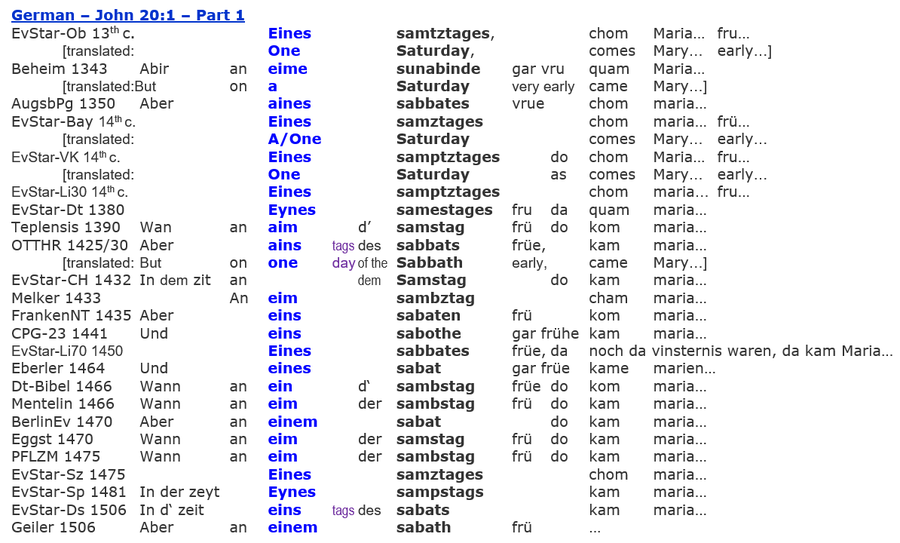

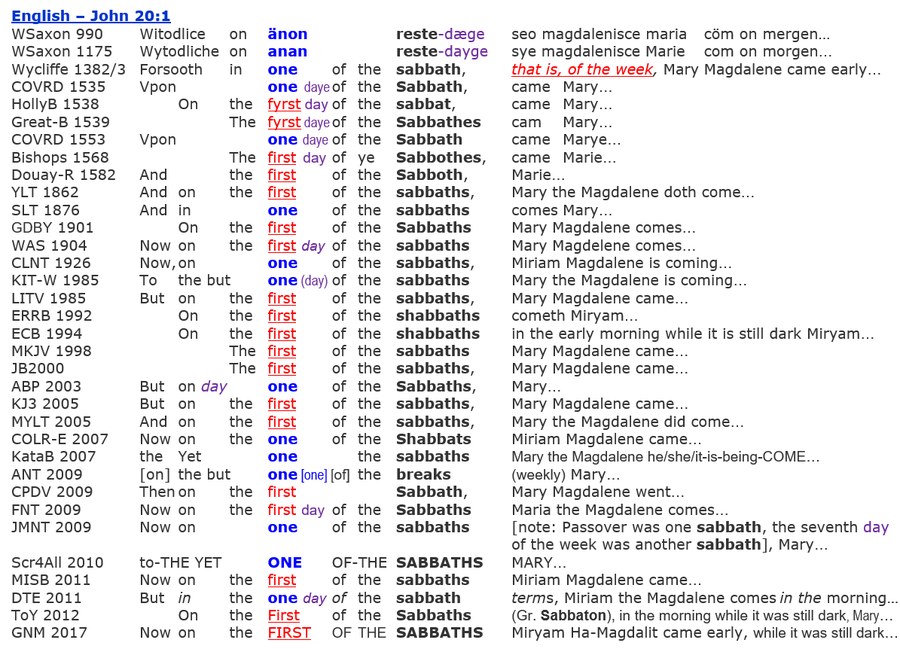









Some Bibles generally speak of "on one day a week", whereby every day can be meant. However, the introduction of the word "week" is definitely wrong. If the evangelists had meant the week, they would have used the corresponding Greek word "ebdomada", which all people knew. But in the Greek text they did not speak of just any day, but of the Sabbath, a day that has been clearly defined since the creation of the earth:

Incorrect translations that postpone the day of resurrection in John 20:1
As can be clearly seen, a chaos of translations has developed over the centuries. It is absolutely impossible that the one basic Greek text offers two different resurrection days of Jesus, from which every Christian can choose one that he would like to have. This variety of the most diverse and contradictory translations makes it clear that we can speak of a deliberate falsification of the Word of God. The closer we get to the coming of Jesus Christ and the Rapture, the more Bibles dare to erase the Sabbath from the Bible and replace it with the unbiblical word "Sunday". So far no human being has succeeded for 2,000 years in finding the corresponding Greek words for "after", "week", "Lord's day" or "Sunday" in the basic text of John 20:1. Anyone who is of a different opinion is welcome to prove it to the entire Christendom, which so far has only been able to find "one of the Sabbaths" in the Greek texts.
And the reality is even worse, because some Bible programs even translate old correct German, Spanish, Italian, Swedish or Czech Bibles incorrectly (see old Bibles), because they now always turn „on a/first Sabbath/Saturday“ or „on the one/first of the Sabbaths/Saturdays“ into „on the first day of the week“ or „on a Sunday“. In concrete terms, this means that not only the statements of the ancient languages Greek and Latin are being falsified, but also those of the modern languages, where Bibles that have already been correctly translated into national languages are being falsified again. Apparently, you cannot speak of a Sabbath or Saturday in any language in the world because it supposedly always means „on the first day of the week“ or „on a Sunday“. This shows how demonic the whole thinking of some people is. They cannot be convinced by arguments, but want to see Sunday in the Bible with all their might and by force. They come up with the craziest arguments just to seduce the Bride of Christ and take her away from God's biblical calendar with its feast days to ancient pagan feast days that are not mentioned once in the entire Bible.
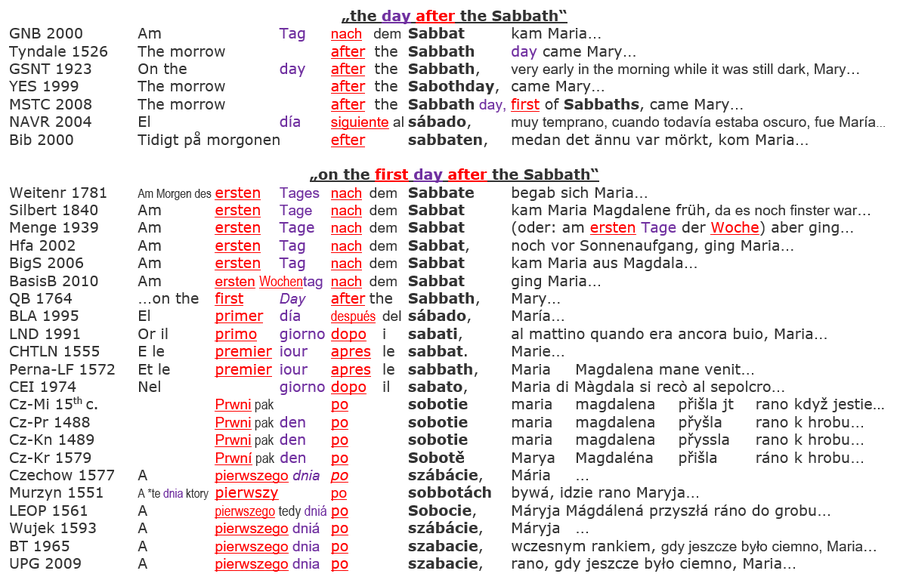
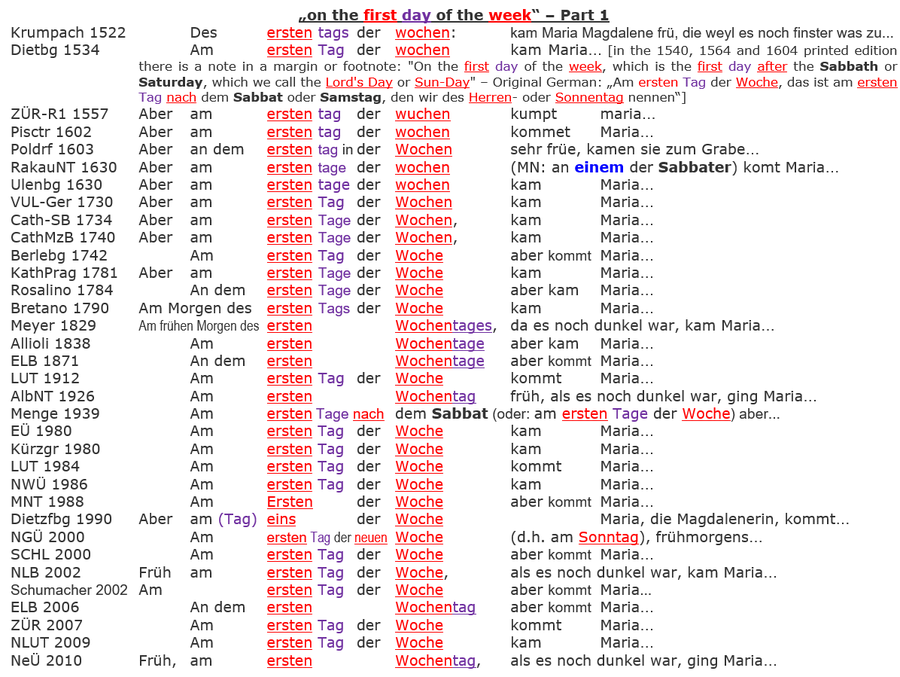

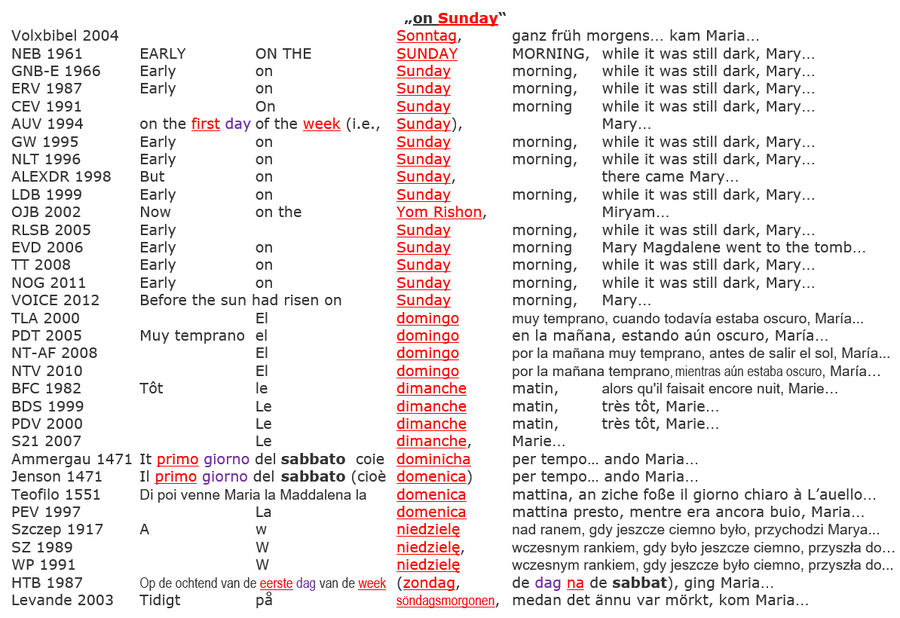
For the list of abbreviations of the Bibles see link. The original copies of most Bibles can
be downloaded as facsimiles from the Internet free of charge
(see Historical Bibles).
„Prove all things; hold fast that which is good. Abstain from all appearance of evil“
(1Thess 5:21-22)
„Take no part in the unfruitful works of darkness, but instead expose them“
(Epheser 5:11)


